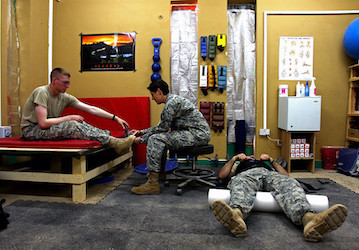Every year, thousands of Service Members suffer new injuries, and even more deal with old injuries. Musculoskeletal injuries (MSK-Is) are a leading cause of lost-duty time in the military, and they play a big role in the mental fitness of those who suffer from them.
Much like athletes can have self-identity issues when they’re injured, Service Members can deal with similar problems, such as stigma about being injured or fear of other negative consequences for reporting their injuries. If you let the negative perceptions about injury determine when you seek treatment, your injury could get worse and your recovery could be drawn out even longer. You might find yourself having trouble with your confidence, anxiety, mood, concentration, and other areas of mental fitness.
Injury psychology
Musculoskeletal injuries, such as ligament sprains, muscle strains, and general pain, are more complex than just damage to your body. MSK-Is can be devastating, not only physically, but psychologically and emotionally too. It can be seen as a shot to your personal identity and create perceptions that you’re weak, “soft,” or unwilling to put unit and mission above yourself. While these perceptions aren’t always accurate, and the impact of injury has gained greater acceptance as a real threat in recent years, these facts don’t stop people from thinking them.
After injury, it’s common to feel depressed and anxious, even at low enough levels that you wouldn’t likely be diagnosed. For Service Members in particular, some anxiety might be related to fear about the consequences of an injury, such as profiles and negative impacts to career progression. Even after you return to duty following complete physical rehabilitation, it’s still common to experience fear and anxiety about being re-injured, not performing at pre-injury levels, or just appearing to others as unfit for duty.
Injuries often have a psychological component that needs to be addressed to fully recover and return to duty at pre-injury levels.
Coping strategies after injury
Learn more about your injury
You can improve your rehab results by learning about what damage occurred to your body, how it’s typically repaired, and how long the rehab process might take. By fully understanding your injury and rehab process, you can set clear expectations about recovery, which can improve your physical and mental health outcomes.
Setting realistic expectations also can help manage “fear-avoidance beliefs” and pain or injury “catastrophization.”
- Fear avoidance is the tendency to avoid certain actions you’re afraid will make your pain or injury worse. High levels of fear-avoidance beliefs can actually slow the recovery process when someone trying to heal avoids the very exercises that can help.
- Catastrophization is when someone has an overly negative belief about pain or injury. For example, someone might say, “This is the worst thing that could have happened to me” or “This will absolutely disqualify me from SOF Assessment and Selection.”
Understanding your injury and the recovery process can help you manage those beliefs and promote better post-injury results.
When learning about your injuries and specific condition, get the facts from your medical provider. If you decide to look up information on the Internet, be extremely careful to choose reputable, vetted sources. It’s not uncommon to find worst-case scenarios or information that doesn’t match up with your specific case. Also, keep in mind your primary care provider might not know the ins and outs of the rehab process. For that information, ask an athletic trainer, physical or occupational therapist, or the healthcare professional who is running your rehab program.
Think optimistically
Optimistic thinking involves focusing on where you have control in a situation and accepting what you don’t control, so you can remain focused and productive. Optimistic thinking is especially important when you’re recovering from an injury because it can help you combat the negative effects of the injury where you think you should still excel. You might catch yourself focusing only on what you can’t do, or feeling overwhelmed with regret or anger over what caused the injury. This can prevent you from taking purposeful action to recover and maintain your performance in other aspects of your life.
Set goals
Setting goals is just as important for coming back from an injury as it is for improving your performance when you’re healthy. Setting realistic SMART goals gives you small milestones to achieve along the recovery process, helping keep you engaged, motivated, and on track with your rehab plan. Goal setting has also been shown to improve rehab through bigger strength gains compared to people who don’t set goals.
Seek social support
Social support plays an important role in maintaining your mental fitness after you get injured and while you recover. While a high level of social support doesn’t seem to be as important when injury-related stressors are low (speaking only about injury, not other life stressors), it does play a big role in reducing the negative effects of an injury, for example, reducing how upset you feel by the injury. Social support is also important when it comes to sticking to your rehab program, helping you recover better and faster than if you didn’t stick with it. You can find and build social support in many places. Many people find it with family members, close friends, or other unit members.
Learn more about social support networks at HPRC’s “#GotMySix” campaign.
